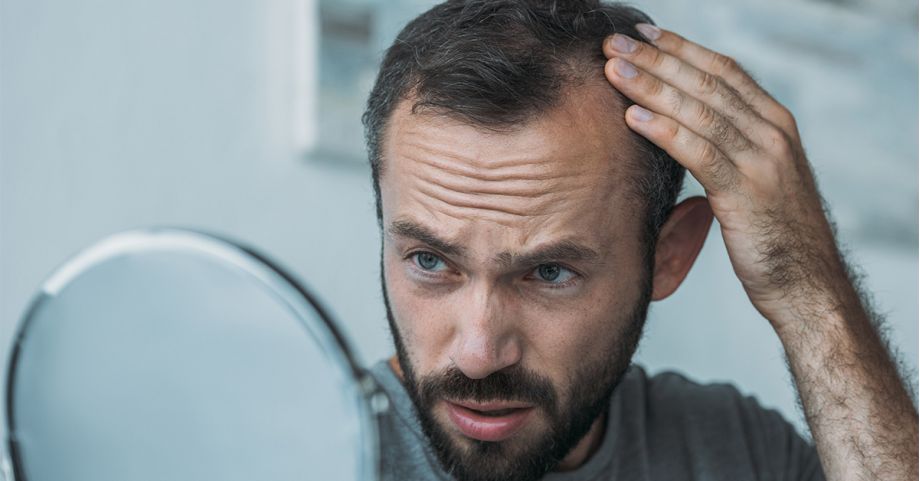
Naples Cosmetic Surgeons Ask: “Are You Making Your Hair Loss Worse?
Researchers recently confirmed that stress can turn hair gray, but did you know that stress can also cause hair loss? In 2021, the same researchers who uncovered the link between stress and graying hair published a study identifying the underlying cellular-level mechanisms linking stress to hair loss. While this research may lead to treatments that address stress-induced hair loss, stress avoidance appears to be the only fix for now.
Of course, stress is not the only reason millions of Americans experience hair loss to the extent that 50% of men experience balding, and 25% of women have visible female pattern hair loss by age 50. In fact, at least a half-dozen factors can, directly and indirectly, cause visible hair loss. And while there isn’t a distinct cure, the cosmetic surgeons at Naples Plastic Surgery offer hair restoration options to their southwest Florida-area patients. Read on to learn more about the causes of hair loss, and then consider consulting with Naples Plastic Surgery to restore your lost hair.
Your Hair Loss May be Hereditary
Hair loss runs in the family, as genetics is the most common cause of hair loss connected with aging. Otherwise known as male-pattern and female-pattern baldness, androgenic alopecia affects an estimated 50 million men and 30 million women in the U.S. This form of hair loss can begin affecting men in their late teens and 20s and some females in their 30s. Still, most women typically experience it after menopause. The hair loss occurs in a progressive and predictable pattern in men, causing an M-shaped receding hairline and thinning on the crown, which usually progresses to partial or complete baldness. In women, the condition causes noticeable hair thinning across the head but rarely leads to partial or total balding.
Researchers believe that genetic influences on hormones cause androgenic alopecia. While androgen hormones are connected to the hair loss, researchers have not yet isolated the genes responsible for triggering their impact on hair follicles.
Speaking of hormones, hormonal changes brought on by pregnancy, childbirth, menopause, and thyroid problems can also cause temporary or permanent hair loss.
Medical Conditions, Medications, and Treatment
Several medical conditions can cause permanent or temporary hair loss, as can some medications and treatments. Alopecia areata is an autoimmune disorder that affects hair follicles in a way that can cause small bald patches on the scalp and hair loss on other parts of the body. It can impact people of all ages, sex, skin color, and hair type and usually manifests by age 40. Trichotillomania is a mental disorder that gives people an uncontrollable urge to pull out their hair, leading to bald spots and thinning hair. This disorder tends to arise in early adolescence and affects women over men by a 9-1 ratio. Several scalp infections, such as ringworm, piedra, folliculitis, seborrheic dermatitis, and Demodex folliculorum, can cause or contribute to hair loss.
Along with nausea, hair loss is the most recognized side-effect of cancer chemotherapy drugs, while radiation therapy to the head and neck area is another known cause of hair loss. Other drugs that include potential hair loss as a side effect include some that treat high blood pressure, acne, arthritis, gout, depression, immune disorders, and heart problems.
How Do You Treat Your Hair?
On average, we lose 50 to 100 hairs per day, but our hair follicles consistently produce new hair. Hair loss becomes ever more evident when the production can’t keep up with the loss. If you mistreat your scalp and hair, that natural daily average loss will far outpace natural production, leading to noticeable and expanding longer-term hair loss.
Mistreatment comes in many forms, including hair styling that involves excess heat, harsh chemicals, and too much manipulation that can tug the hairs from the follicles. And, like the rest of your body, your hair needs nutrients and vitamins to maintain strength and vitality. An unhealthy diet will weaken your hair and inhibit hair growth.
Contact Naples Plastic Surgery for Your Hair Restoration Options
If you’re struggling with permanent hair loss in the southwest Florida area, Naples Plastic Surgery offers several options that can help restore the youthful appearance of a full head of hair. Hair restoration at Naples Plastic Surgery is overseen by Dr. Michael F. Wisiorek, MD, a double-board certified world-renowned expert in hair restoration. To learn more, contact Naples Plastic Surgery today at 239.566.2611 to schedule your initial consultation.

